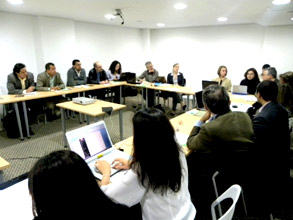Role of journalism in building trust among Andean countries on agenda of UNESCO workshops
15-11-2010 (Quito)

Meeting in Bogota
© UNESCO
A recent meeting in Bogota addressed the coverage by media of diplomatic crisis between Colombia, Ecuador and Venezuela. The strategies identified at this meeting will be shared with larger groups of journalists from the three countries during two forthcoming workshops in Quito (16 and 17 November 2010) and Bogota (3 and 4 December 2010).
Journalists from major media outlets in Ecuador, Colombia and Venezuela, as well as professionals in international relations and media content analysis examined the Andean press coverage of bilateral relations and discussed strategies to broaden the media’s information agenda last month in Bogota, Colombia.
The meeting was organized within the framework of the IPDC project, Strengthening the Role of Journalism in the Building of Trust between Nations, implemented by Media for Peace (Colombia) in collaboration with UNESCO’s Office in Quito.
How have the several diplomatic crisis between Colombia, Venezuela and Ecuador been covered by the media? This question opened the event and fostered a debate about the role of journalism in building trust among nations.
A study by the Universidad Javeriana of Colombia on the media coverage of political crisis was the basis for the discussion. One of the problems the study identified was the "presidentialisation” of news, which is focusing exclusively on the subjects related to the countries’ presidents. Another issue is that news articles are often based on press releases and press conferences, and published by the media without verifying or contrasting the sources. According to the study, "this results in biased information, which consequently leads to the stigmatisation of governments when narrating the events between protagonists and antagonists, presenting the other as a rival and in some cases as an enemy".
The results of this study contributed to a collective reflection on how media coverage in the sub-region is not reaching adequate journalism standards and is rather functioning as a polarising instrument that does not benefit the citizens of these countries. One of the counteracting strategies could be using a wider range of information sources to ensure balance and diversity of viewpoints, instead of presenting only governmental or opposition perspectives.
So far, the situation of refugees and people living near the borders has been usually taken as an isolated fact, unrelated to the countries’ bilateral relations. Moreover, Venezuelan journalists warned that drug trafficking is not being discussed within the framework of bilateral relations and that there is very little research and coverage of this issue due to the risk involved.
Based on this, participants proposed to create a permanent cooperation network of journalists that would allow sharing information and provide publishing opportunities, not only on issues related to drug trafficking, but on a variety of topics, thus opening new horizons for journalism in the region.
The meeting was organized within the framework of the IPDC project, Strengthening the Role of Journalism in the Building of Trust between Nations, implemented by Media for Peace (Colombia) in collaboration with UNESCO’s Office in Quito.
How have the several diplomatic crisis between Colombia, Venezuela and Ecuador been covered by the media? This question opened the event and fostered a debate about the role of journalism in building trust among nations.
A study by the Universidad Javeriana of Colombia on the media coverage of political crisis was the basis for the discussion. One of the problems the study identified was the "presidentialisation” of news, which is focusing exclusively on the subjects related to the countries’ presidents. Another issue is that news articles are often based on press releases and press conferences, and published by the media without verifying or contrasting the sources. According to the study, "this results in biased information, which consequently leads to the stigmatisation of governments when narrating the events between protagonists and antagonists, presenting the other as a rival and in some cases as an enemy".
The results of this study contributed to a collective reflection on how media coverage in the sub-region is not reaching adequate journalism standards and is rather functioning as a polarising instrument that does not benefit the citizens of these countries. One of the counteracting strategies could be using a wider range of information sources to ensure balance and diversity of viewpoints, instead of presenting only governmental or opposition perspectives.
So far, the situation of refugees and people living near the borders has been usually taken as an isolated fact, unrelated to the countries’ bilateral relations. Moreover, Venezuelan journalists warned that drug trafficking is not being discussed within the framework of bilateral relations and that there is very little research and coverage of this issue due to the risk involved.
Based on this, participants proposed to create a permanent cooperation network of journalists that would allow sharing information and provide publishing opportunities, not only on issues related to drug trafficking, but on a variety of topics, thus opening new horizons for journalism in the region.

Meeting in Bogota
© UNESCO
Related themes/countries
· Colombia
· Ecuador
· Venezuela
· Training of Media Professionals
· Weekly newsletter
Share this story:
Contact information
- UNESCO
Source
- UNESCO Office in Quito (in Spanish)
Field office














